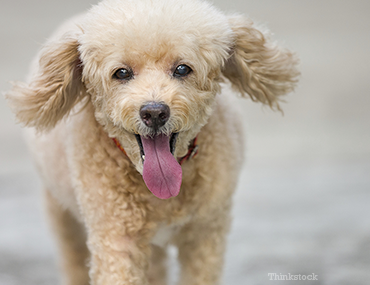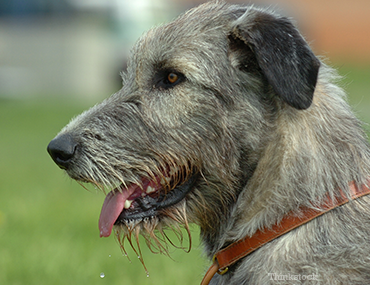1. What is bloat in dogs?
Gastric dilatation-volvulus, more commonly known as “GDV” or “bloat,” is a life-threatening emergency seen in dogs. GDV occurs when the stomach becomes initially bloated (due to gas, food, and/or liquid). Once the stomach becomes distended and bloated, it is more likely for it to rotate out of normal position; after rotating (typically 90-360°) the stomach can twist off to become a gastric dilatation-volvulus (GDV).
When the stomach rotates, it is anchored down at the esophagus and intestines. A GDV prevents any stomach contents from moving out of the stomach and into the intestines, and is fatal without immediate treatment. That’s because the dilatation of the stomach compresses major blood vessels in the abdomen (e.g., the caudal vena cava) and results in severe signs of shock.
2. What symptoms of shock will my dog show if he has bloat?
Clinically, signs of shock include the following:
- An elevated heart rate
- Collapse
- Pale gums
- Weakness
- Lethargy
- Low blood pressure
- Increased respiratory rate
3. What if my dog has bloat but doesn’t have surgery?

GDV is a surgical emergency and dogs must be treated with surgery to survive. Untreated, GDV can result in the following:
- Severe pain
- Decreased blood flow to the stomach and intestinal tract
- Necrosis of the tissue
- Ruptured stomach
- Sepsis (i.e., when bacteria enters the blood stream)
- Complications including aspiration pneumonia, abnormal clotting due to DIC, etc.
- Abnormal heart arrhythmias
- A distended spleen
- Abnormal blood loss into the abdomen (e.g., hemoabdomen)
- Acute death
4. What breeds of dogs are predisposed to bloat?
Unfortunately, certain breeds are at greater risk for GDV including giant breed dogs with deep chests. Pet owners of the following breeds should be especially aware of the risk of GDV in their pet, and monitor them carefully:
- Standard Poodles
- Great Danes
- Irish Wolfhounds
- German Shepherd
- Other breeds with similar body shapes or sizes
5. But I have a small dog, so am I safe from worrying about bloat?
Occasionally, smaller breeds have been reported to also develop bloat:
- Basset Hounds
- Dachshund
- Pekingese
- Shar-peis
- Mixed-breeds
6. What clinical signs of bloat should I monitor my dog for?
Clinical signs of GDV (bloat) include the following and warrant an immediate visit to your veterinarian or emergency veterinarian. If your dog is showing these signs in the middle of the night, you need to get out of bed and get to an emergency veterinarian; waiting until morning to treat can be fatal for your dog.
- Difficulty swallowing
- Hypersalivating/drooling (this is due to the stomach being twisted and the inability to swallow the saliva)
- A large, distended stomach or sprung ribs
- Retching constantly or attempting to vomit – with nothing coming out
- Constant panting
- Not eating
- Anxiety (e.g., pacing, crying, whining, not being able to sleep)
- Signs of shock (see above)
- Severe pain
- Weakness or inability to move
- Collapse
- Sudden death
7. How do you treat bloat in dogs?
Treatment for GDV includes immediate stabilization by your veterinarian, including aggressive intravenous (IV) fluids, pain medication, electrocardiogram and blood pressure monitoring, anti-vomiting medication, and removal of the air/food from the stomach. Once the patient has been stabilized, immediate surgery is required to correctly position the stomach, untwist it, staple the stomach down (to prevent it from re-occurring and re-twisting), and make sure none of the other organs or tissues (e.g., spleen, esophagus, intestines, etc.) are injured.

8. How much will bloat treatment cost?
In general, treatment for GDV, including surgery, anesthesia, supportive care, and post-operative management typically runs from $2500-5,000, uncomplicated. Unfortunately GDV does require surgical treatment so the other option to consider is humane euthanasia if surgery isn’t an option.
9. Can my dog die from bloat if I don’t treat it?
Unfortunately, GDV is often still a cause for “sudden death.” This is a terribly painful way to die, and is often due to the lack of observance of clinical signs in your dog. Make sure you know what signs to look for, and when in doubt, always take your dog to a veterinarian if you are concerned.
10. What’s the prognosis for bloat if I do take my dog to surgery?
The prognosis to recover from GDV is actually excellent with supportive care and surgery (over 90% survival). Keep in mind that the longer you wait and neglect the signs, the poorer the prognosis.
If you have any questions or concerns, you should always visit or call your veterinarian -- they are your best resource to ensure the health and well-being of your pets.
